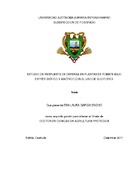Mostrar el registro sencillo del ítem
Estudio de respuesta de defensa en plantas de tomate bajo estrés biótico y abiótico con el uso de elicitores
| dc.contributor.advisor | González Morales, Susana | |
| dc.contributor.author | García Enciso, Emma Laura | |
| dc.contributor.other | Benavides Mendoza, Adalberto | |
| dc.contributor.other | Valdez Aguilar, Luis Alonso | |
| dc.contributor.other | Reyes Valdés, Manuel Humberto | |
| dc.contributor.other | Robledo Olivo, Armando | |
| dc.date.accessioned | 2018-03-02T18:01:41Z | |
| dc.date.available | 2018-03-02T18:01:41Z | |
| dc.date.issued | 2017-12-02 | es_MX |
| dc.identifier.uri | http://repositorio.uaaan.mx:8080/xmlui/handle/123456789/42930 | |
| dc.description | Las condiciones de estrés abiótico como la salinización, temperatura, radiación y sequía causan grandes pérdidas a la producción agrícola en todo el mundo | |
| dc.description.abstract | "Con el objetivo de evaluar la inducción de tolerancia al estrés por déficit hídrico se evaluó en plantas de tomate la aplicación de un bioestimulante a una concentración de 2.5 ml L-1. El experimento se realizó en los años 2015 y 2016 en Saltillo, Coahuila, México y consto de tres tratamientos: (1) testigo absoluto (TA), (2) condición de déficit hídrico más la aplicación del bioestimulante (DHB) y (3) tratamiento bajo condiciones de déficit hídrico (DH). Se realizaron dos aplicaciones foliares del bioestimulante antes de la condición de estrés y una tercera cuando se alcanzó una tensión en el sustrato de 35 kPa. Se determinó la altura de planta, biomasa seca aérea y radicular, rendimiento, número de frutos y peso promedio de fruto. En frutos se evaluó la firmeza, sólidos solubles totales (SST), pH, contenido de vitamina C y licopeno. Los resultados mostraron que la aplicación del bioestimulante promovió una respuesta positiva sobre la altura, rendimiento, número de fruto y peso promedio de fruto. La biomasa radicular disminuyó en un 43.8% en el tratamiento DH, mientras para DHB el decremento fue de 24.6% con respecto al TA. Para los SST, se observó un incremento en el tratamiento DH y una disminución en DHB. El peso seco en tallos y hojas, así como la vitamina C, pH, firmeza y contenido de licopeno no mostró efectos negativos asociados a la aplicación del bioestimulante. La aplicación del bioestimulante permitió reducir los efectos adversos de la condición de estrés por déficit hídrico." | es_MX |
| dc.format | ||
| dc.language | Español | es_MX |
| dc.rights | Acceso Abierto | |
| dc.rights.uri | CC BY-NC-ND - Atribución-NoComercial-SinDerivadas | |
| dc.subject | CIENCIAS AGROPECUARIAS Y BIOTECNOLOGÍA | es_MX |
| dc.subject.other | Déficit hídrico | |
| dc.subject.other | Bioestimulante | |
| dc.subject.other | Calidad de fruto. | |
| dc.title | Estudio de respuesta de defensa en plantas de tomate bajo estrés biótico y abiótico con el uso de elicitores | es_MX |
| dc.type | Tesis de doctorado | es_MX |
| dc.description.abstractEn | "The aim of this study was to evaluate the effect the induction of stress tolerance due to water deficit, for this the application of a biostimulant at a concentration of 2.5 ml L-1 in tomato plants was evaluated. The experiment was carried out in the years 2015 and 2016 in Saltillo, Coahuila, Mexico and consisted of three treatment: (1) absolute control (AT), (2) condition of drought plus the application of the biostimulant (DB) and (3) treatment under conditions of drought (DD). Two foliar applications of the biostimulant were made before the stress condition and a third application when a tension in the substrate of 35 kPa was reached. The plant height, dry aerial and root biomass, yield, number of fruits and average fruit weight were determined. In fruit, firmness, total soluble solids (TSS), pH, vitamin C content and lycopene were evaluated. The results showed that the application of the biostimulant promoted a positive response on height, yield, number of fruit and average fruit weight. The root biomass decreased by 43.8% in the DD treatment, while DB the decrease was 24.6% with respect to the AT. The TSS, increased in the DD treatment and decreased in DB. The dry weight in stems and leaves, as well as vitamin C, pH, firmness and lycopene content did not show negative effects associated with the application of the biostimulant. The application of the biostimulant reduced the adverse effects of the stress condition due to drought." | |
| dc.audience | Estudiantes | |
| dc.audience | Investigadores | |
| dc.publisher.place | Saltillo, Coahuila, México | es_MX |
| dc.type.thesis | Digital |
